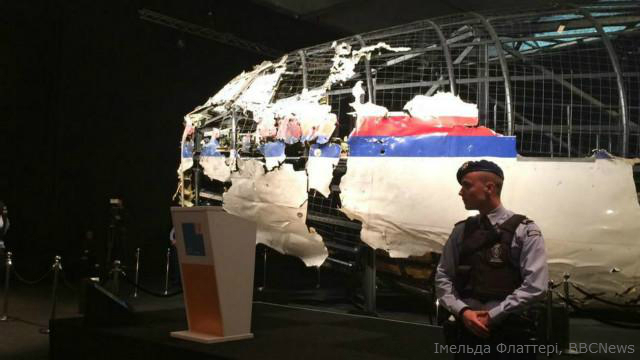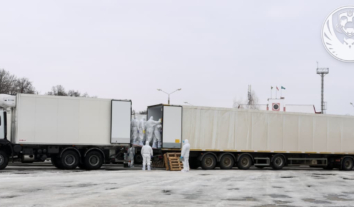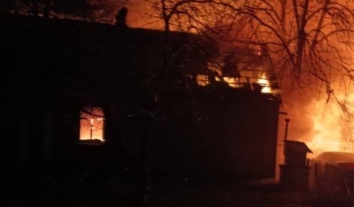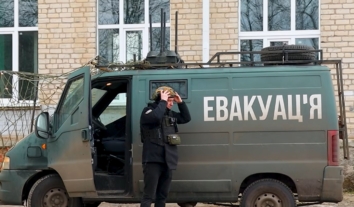Ukraine offered to use international mechanism to investigate international crimes
The international crimes are best investigated by the national authorities with the assistance of the international experts at the local level, having established the single legal framework.
This was stated by ex-New York prosecutor, former prosecutor of the International Criminal Court (ICC) James Goldston at the roundtable meeting with participation of the NGOs and government bodies.
“Experience shows that the best way to overcome international crime is the local level, the efforts of national authorities of the country where the crimes occur. At this level, you can easily access victims and witnesses. In this country, people speak the same language… So these procedures at the national level enjoy the highest level of trust and are more likely to bring the perpetrators to justice,” said James Goldston, the executive director of the Open Society Justice Initiative.
According to the expert, the national authorities are responsible for investigating international crimes as the ICC has limited resources.
“Even if the ICC is doing everything possible, this will anyway affect the small part of crimes taking place in a country as the court has limited capacity. One court can perform only a certain part of things. So the primary responsibility rests with the national authorities,” the Human Rights Information Center correspondent quotes James Goldston as saying.
“If safety does not allow this, you have to think and make the mechanism work outside the country. However, the question arises then whether it will be centralized or decentralized,” said Eric Witte, senior project manager for national trials of grave crimes at the Open Society Justice Initiative.
“I wish all these cases were not considered in the court, the credibility of which is about 5%. I wish the war crimes were not considered far from the eyes of the world media, somewhere in Mariupol or Kramatorsk. They should be considered here in Kyiv under the scrutiny of cameras with maximum care and under the lens of all those concerned,” Roman Romanov, director of the human rights and justice program at the International Fund “Renaissance”, said.
The international community has provided a variety of assistance to the national authorities in different ways.
“We have seen how postwar Bosnia, the former Yugoslavia, tried to implement the so-called mixed mechanism, involving international and domestic prosecutors and judges. Together they attached the sufficient level of trust to that process as well as international expertise, being the component of the trials and investigations,” James Goldston noted.
Another model was used in Cambodia. The international judges and investigators actually started to work in the national court, where the majority of judges, prosecutors and investigators had been Cambodians.
Eric Witte believes that Ukraine needs assistance in the investigation of corruption crimes, as it was in Cambodia.
“Cambodia has the specialized houses for war and corruption crimes, which investigates these crimes at the highest level. The international experts work in both houses. Maybe it makes sense for Ukraine to think of such a model to investigate corruption cases,” Eric Witte suggests.
He also recalled experience of Guatemala, where the special commission to carry out parallel investigation had been set up. The cases were tried in the Guatemalan courts.
“That system was also very effective in the country, where incredible corruption and organized crime affected the highest level of the government and judiciary,” Eric Witte added.
“Five judges started to work in the house in Bosnia. Of them, three were representatives of the international community, two other were Bosniaks. The situation changed over the course of time, the majority of judges became Bosnian. Today, all the judges are representatives of Bosnia. So the idea is to set up specific institution involving international experts, who will leave as the capacity of national level strengthens so that other agencies in the country can take over sufficient degree of objectivity and professionalism,” the program director of the Open Society Justice Initiative said.
The expert does not recommend that Ukraine should set the time frame of its action while establishing the mechanism. The suspects for the international and corruption crimes will obstruct its implementation.
According to Eric Witte, before setting up such a mechanism Ukraine should decide whether it will investigate crimes of a very narrow group of perpetrators or crimes of thousands of perpetrators.
 “We need to consider how the established mechanism is linked with the procedures and work of the International Criminal Court, as well as the investigation into crash of the Malaysian Airlines Flight MH17. It is important to think about such things from the outset,” Eric Witte noted.
“We need to consider how the established mechanism is linked with the procedures and work of the International Criminal Court, as well as the investigation into crash of the Malaysian Airlines Flight MH17. It is important to think about such things from the outset,” Eric Witte noted.
The project manager insists on providing procedural safeguards for the accused on different sides. This will increase confidence even among those social groups who are skeptical of such a mechanism.
The experts point out that the Parliament has to recognize such a mechanism at the legislative level.
“Some kind of an agreement with the UN should be signed to set up such a mechanism. This will obviously require legislative approval, adapting it to the effective constitutional framework,” Eric Witte said.
The majority of the MPs ignored the roundtable meeting with the participation of international experts. It was attended only by Leonid Yemets (People’s Front Party), Svitlana Zalishchuk (Bloc of Petro Poroshenko) and Heorhiy Lohvynsky (People’s Front Party).
As a reminder, representatives of the ICC will arrive in Ukraine in late October to determine the possibility of consideration of Ukraine’s materials on investigation into the events on Maidan and the Russian aggression.
Ukraine has not yet ratified the Rome Statute and thereby has not joined the International Criminal Court as a full member.
Ukraine signed the Rome Statute in 2000. However, next year the Constitutional Court ruled that the document contradicted the Constitution of Ukraine, requiring amending Article 124 of the Constitution.
January 16, 2015, the MPs registered the bill on amendments to Article 124 of the Constitution (concerning recognition of provisions of the Rome Statute). However, according to MP Vitaly Kupriy, the initiative has been hampered by the President of Ukraine.
Ukraine has made commitment to ratify the Rome Statute under the EU-Ukraine Association Agreement.














